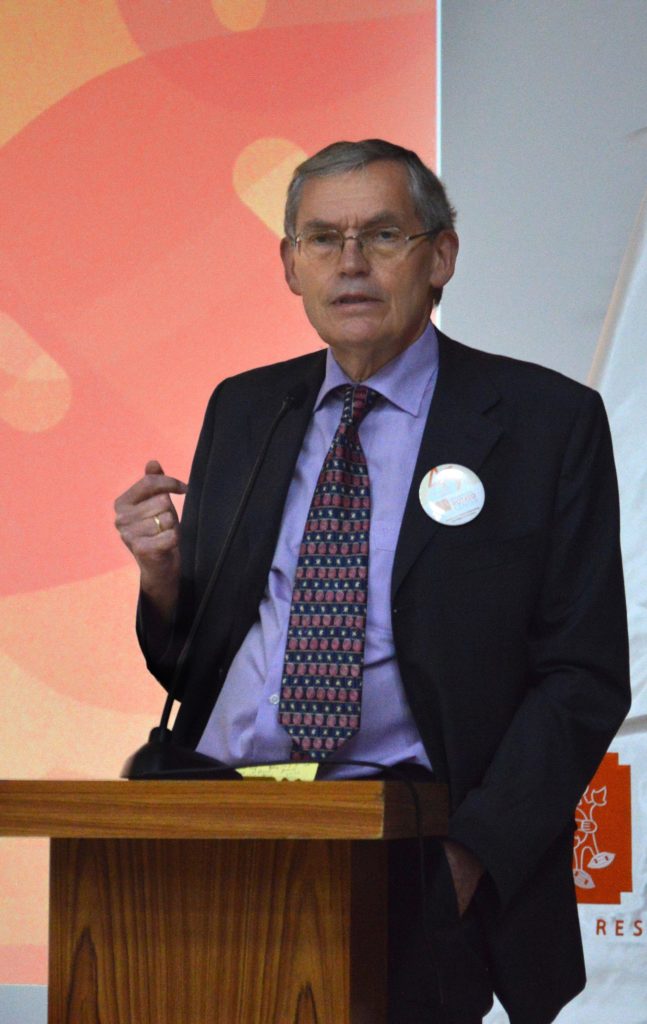Statement by the Board Chair
The International Potato Center’s Board of Trustees remains firm in its commitment to provide programmatic governance and the financial oversight and leadership that ensures the Center’s effective and efficient management. It is a privilege to serve an organization working with partners to achieve food security, well-being, and gender equity for poor people in root and tuber farming and food systems worldwide.
Center Highlights
In 2016, CIP continued to gain ground in accomplishing our 2014 strategic objectives to deliver impact at scale. CIP set a target of reaching 10 million households in Sub-Saharan Africa by 2020 with orange-fleshed sweetpotato. A full 30% of that ambitious target has been met.
The Agile Potato for Asia Program is working to mitigate the impact of climate change, high population density, and land degradation on the world’s poor. Significant progress has been made in developing fast-maturing disease resistant varieties that provide flexible planting and harvesting times, without putting undue pressure on dwindling land and water resources.
The Seed Potato for Africa projects are on track to reach CIP’s goal of providing 600,000 smallholder farmers in Africa’s potato growing regions with high-quality seed. By the end of 2016 the program had reached 23% of its target.
The appropriately named Game Changing Solutions strategic objective, which uses advanced science to accelerate research, has shown significant results in Ugandan field trials in combatting the greatest threat to potato—late blight. This advance, though in its infancy, could indeed be a game changer for smallholder farmers. These are but a few of the notable achievements on the scientific front that CIP reports for this past year.
Financial Performance
Still recovering from a reduction in Window 1 and Window 2 funding over the past two years, CIP saw a leveling in revenues for 2016. Total revenue reported in 2016 was $58.7M. The revenue from Windows 1 and 2 represents a decrease of $6.5M, while Window 3 and Bilateral increased by $8.1M when compared to 2015. CIP’s operating expenses in 2016 are $59.7M and include a reduction of $0.8M from 2015.
The short-term solvency indicator (liquidity), which measures the number of days of working capital to fund expenditure excluding depreciation, was 105 days as of December 31, 2016. The long-term financial stability indicator (adequacy of reserves), which measures the number of days of unrestricted net assets, was 90 days (both indicators are within the CGIAR recommended norms). The indirect cost ratio of the Center was 15.2% for 2016. The ratio has been calculated following CGIAR Financial Guidelines No. 5 and expresses the relation between direct and indirect costs.
CIP’s financial indicators reflect the Center’s continued financial health, though no institution is immune to financial or operational risk. To mitigate risk, the Board’s Audit Committee ensures oversight of CIP’s risk management policies and plans. In a much broader sense, the Board oversees Center operations in the interest of donors and stakeholders.
Outstanding Achievements in Biofortified Orange-Fleshed Sweetpotato, Eliminating Childhood Blindness and Contributing to Reduction in Stunting
The year 2016 was outstanding for CIP. Our groundbreaking orange-fleshed sweetpotato (OFSP) work received important accolades. Three of our scientists, Dr. Maria Andrade, Dr. Robert Mwanga, and Dr. Jan Low were honored with the 2016 World Food Prize for enriching sweetpotatoes, resulting so far in health benefits for 10 million people (about 3 million households) across 14 countries in Sub-Saharan Africa. This prize was in acknowledgement of the single most successful example of biofortification to date. It is positive recognition that agricultural interventions can have a positive effect on nutrition, in this case, vitamin A deficiency. In addition, the entire CIP orange-fleshed sweetpotato team was awarded the Al-Sumait Prize for African Development for Health and Food Security for this work. The prize honors individuals or institutions who help to advance economic and social development, human resources development and infrastructure on the African continent.
Appreciation
I would like to express my gratitude and appreciation to VM Zhang Taolin who finished his term on the Board in 2016, and who served with dedication and high standards during his tenure as board member. I would also like to welcome Dr. Vo-Tong Xuan, Rector of Nam Can Tho University of Vietnam and Dr. Qu Dongyu, Vice Minister of Agriculture of the Peoples’ Republic of China.
On behalf of the Board, I would like to thank CIP’s funders, investors, and all CGIAR partners for their support. I also extend my appreciation to CIP’s management and staff for their continued dedication to the organization and its important mission.
Dr. Rodney Cooke
Chair, Board of Trustees


